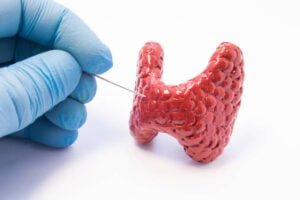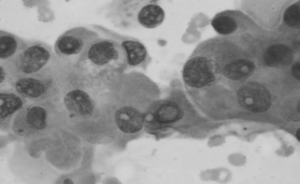THYROID BIOPSY: A Comprehensive Guide to Fine Needle Aspiration Cytology (FNAC)

Introduction
When a thyroid nodule is detected, it is crucial to evaluate its nature and determine if it is cancerous. Fine needle aspiration cytology (FNAC) is a widely used biopsy technique for thyroid nodules. This article provides a comprehensive guide on FNAC, including its procedure, risks, and potential results, to help you understand and manage thyroid nodules effectively.
Thyroid cancer surgery remains the main treatment in most cases of thyroid cancer.
What is a Thyroid Nodule?
A thyroid nodule refers to an abnormal collection of thyroid cells and tissue, forming a physical lump or growth in the thyroid gland. While most nodules are benign and age-related, it is essential to investigate and rule out cancerous nodules. Read more on thyroid nodules.
Investigations for Thyroid Nodules
Several test may be required when thyroid nodules are detected. These include blood tests and ultrasound examinations of the thyroid gland. Ultrasound helps characterize the nodules and identify any additional ones. Based on size and features, your surgeon will determine if a thyroid biopsy in form of FNAC is necessary.

What is Fine Needle Aspiration Cytology (FNAC)
FNAC is a commonly used biopsy method to obtain tissue diagnosis for thyroid nodules. The primary objective of the thyroid biopsy is to examine the concerning lesion and make an accurate diagnosis.

How to do Thyroid Biopsy?
FNAC is typically performed in an outpatient clinic, with or without local anesthesia. The procedure does not require fasting. Before the thyroid biopsy, your healthcare provider may ask you to discontinue any blood-thinning medications for about a week.
During the procedure:
- You will lie on a bed with your neck extended.
- Your surgeon may use an ultrasound to locate the nodule if it is not palpable.
- After cleansing the area, the surgeon might administer local anesthesia at the injection site.
- Your surgeon will insert a small 23G-24G needle into the thyroid, making multiple passes.
- The needle will then be withdrawn, and they will smear the aspirate onto slides.
- Your surgeon may repeat the process several times to ensure an adequate sample is obtained.
- A plaster will be applied to the injection site, and you can remove it the following day.
The slides will be sent for analysis under a microscope, and the results usually take a few days to a week.


Are there any risk to the procedure?
FNAC is a relatively simple procedure with minimal risks. Some potential risks include temporary pain at the injection site, which usually subsides within a day or two. The risk of bleeding is small, especially if you are not taking blood-thinning medications. It is important to note that the common misconception about needle biopsy spreading cancer cells has been proven to be very low, making FNAC a standard procedure for thyroid nodule evaluation.
What are the possible results of the thyroid biopsy?
The results of thyroid FNAC categorize into these three groups:
Likely malignant or cancerous: If the results indicate a high likelihood of malignancy, your surgeon will discuss with you the role of surgery and further treatment options.
Likely benign or non-cancerous: If the results suggest a low likelihood of cancer, your surgeon will likely advise you to monitor the thyroid nodule with a repeat ultrasound in 6 to 12 months. Although the risk of cancer is low, there is still a possibility of sampling error.
Inconclusive: In cases where the results are inconclusive, your surgeon may ask you to repeat the FNAC in 2 to 3 months for a more definitive result.
Summary
Evaluating thyroid nodules is crucial to determine their nature and potential risks. Fine Needle Aspiration Cytology (FNAC) is a valuable tool for obtaining tissue samples and guiding diagnosis. By understanding the procedure, risks, and potential results, you can actively participate in managing thyroid nodules effectively and ensuring the best possible healthcare outcomes.

Other Thyroid Services
Consult Us

Dr LEE Kuok Chung
Senior Consultant General Surgeon
Subspeciality interest: Colorectal, Advanced Endoscopy and Robotic Surgery

Dr TAN Wee Boon
Senior Consultant General Surgeon
Subspeciality interest: Thyroid, Hernia and Endocrine Surgery

Dr KIM Guowei
Senior Consultant General Surgeon
Subspeciality interest: Upper Gastrointestinal, Bariatric and Robotic Surgery
Crest Surgical Practice
Healing Hands, Compassionate Hearts: Your Partner in Surgical Care



